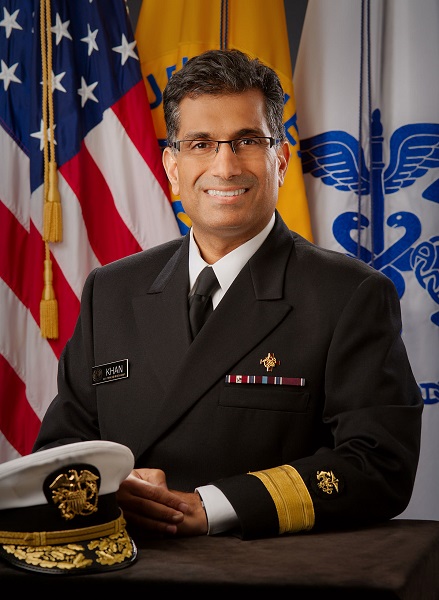Dr. Ali S. Khan is a well-known medical practitioner from Omaha, Nebraska, who is also a well-known Asian Epidemiologist. He is currently a professor at UNMC’s College of Public Health and the author of the book The Next Pandemic, which has received positive feedback from readers.
He has also worked as an Assistant Surgeon General, and with his background, he is now working to combat the pandemic coronavirus. He uses his Twitter account to share research papers and news about recent discoveries and evidence.
Schooling:
Ali Khan earned his medical degree from the State University of New York Downstate Medical Center in Brooklyn, NY, and went on to the University of Michigan for a dual residency in internal medicine and pediatrics. He then went on to Emory University to obtain a Masters in Public Health (MPH).
Profession:
Khan started his federal career in 1991, when he entered the Centers for Disease Control and Prevention (CDC) and the United States Department of Agriculture (USDA). As an Epidemic Intelligence Service (EIS) officer in the Public Health Service Commissioned Corps. Dr. Khan has specialized in bioterrorism, public health, and emerging infectious diseases throughout his career. He designed the CDC’s joint global field epidemiology and laboratory training program while serving as interim Director for global infectious disease activities. Dr. Khan was instrumental in the creation and implementation of the President’s Malaria Initiative, a $1.2 billion, five-year effort aimed at reducing malaria and alleviating poverty in Africa. He has also worked to eradicate polio and guinea worm. Khan also suggested the BioPHusion program as a new public health initiative aimed at improving information sharing among all public health practitioners. During the H1N1 pandemic, BioPHusion was used to detect new cases and prepare response behavior.
Khan’s first involvement with emergency preparedness began in 1999, when he assisted in the establishment of the Centers for Disease Control and Prevention’s (CDC) bioterrorism program, which upgraded local, state, and national public health systems to detect and respond to bioterrorism. Khan developed the Critical Agent list as deputy director of the bioterrorism program, which has since become the foundation for all biological terrorism preparedness. Dr. Khan also released the first national public health preparedness plan, established syndrome-based surveillance, and developed key focus areas to enhance local and state emergency response capabilities. Khan put these plans into action during the first anthrax attack in 2001, when he was in charge of the CDC’s tactical response in Washington, D.C.
Dr. Khan was the Deputy Director of the CDC’s National Center for Emerging and Zoonotic Infectious Diseases before becoming Director of PHPR in August 2010. (NCEZID). Hantavirus pulmonary syndrome, Ebola hemorrhagic fever, monkeypox, Rift Valley fever, avian influenza, extreme acute respiratory syndrome (SARS), the Asian tsunami, and the initial public health response to Hurricane Katrina in New Orleans are among the many domestic and foreign public health crises to which he has responded and led.
Khan released The Next Pandemic: On the Front Lines Of Humanity’s Deadliest Threats in 2016. (with William Patrick). He describes some of his experiences reacting to outbreaks around the world, including many of the ones mentioned above. He offers a wealth of background knowledge for readers interested in public health and emerging diseases, in addition to his personal experiences.
Media & Publications:
Health security in 2014: building on preparedness awareness for emerging health threats, Khan AS, Lurie N. The Lancet, vol. 384, no. 9937, pp. 93-95, 2014.
Classifying infectious disease outbreaks to increase response timeliness and effectiveness, Posid JM, Goodman RA, Khan AS. 89-94 in Disaster Medicine and Public Health Preparedness.
Ensuring the health protection of America’s children, Lurie N, Khan AS. J Pediatr, vol. 163, no. 1, pp. 274-6, 2013.
The Importance of Establishing a National Health Security Preparedness Index, Lumpkin JR, Miller YK, Inglesby T, Links JM, Schwartz AT, Slemp CC, Burhans RL, Blumenstock J, Khan AS. Biosecurity and Bioterrorism: Biodefense Strategy, Practice, and Science (Biodefense Strategy, Practice, and Science) (Biodefense Strategy, Practice, and Science) (Biodefense Strategy, Practice, and Science) (Biodefense Strategy, Practice,
Global Perspectives on Preventing Infectious Diseases Associated with Mass Gatherings, Abubakar I, Gautret P, Brunette GW, Blumberg L, Johnson D, Poumerol G, Memish ZA, Barbeschi M, Khan AS. Infectious Diseases, Lancet, 2012;12:66-74.
Potential Impact of Climate Change on Vector-Borne and Zoonotic Diseases: A Review and Proposed Research Plan, Mills JN, Gage KL, Khan AS. Environmental Health Perspectives, vol. 118, no. 5, pp. 1507-1514, 2010.
The next public health revolution: public health knowledge integration and social networks, Khan AS, Fleischauer A, Casani J, Groseclose SL. Am J Public Health, vol. 100, no. 7, pp. 1237-1242, 2010.
Hantavirus pulmonary syndrome: the sound of a mouse roaring, Montgomery JM, Ksiazek TG, Khan AS. J Infect Dis, 95(11), 1553-5, 2007.
Hemorrhagic fever viruses belonging to the families arenaviridae, filoviridae, and bunyaviridae. McKee KT Jr, Khan AS. S. Gorbach, J.G. Bartlett, and N.R. Blacklow, eds. 3rd Edition of Infectious Diseases Lippincott, Williams & Wilkins is a publishing house based in Philadelphia, Pennsylvania. 2004; Philadelphia, PA.
Evidence that the Endothelium Derived Relaxing Factor of the Rabbit Aorta is Nitric Oxide, Furchgott RF, Khan MT, Jothiaden D, Khan AS. Proceedings of the Sixth International Symposium on Vascular Neuroeffector Mechanisms, Ed. Beran and colleagues ICSU Press, Paris, 1988, et al.
Dr. Ali Khan’s 10 Facts:
- Dr. Ali Khan is a well-known Asian-American epidemiologist who has previously served as the Surgeon General of the United States.
- He was born and raised in New York, but his exact date of birth is unknown, and he seems to be in his late fifties.
- When it comes to his personal life, information about his wife and children is kept under wraps.
- Information about his parents and siblings are also hidden under the mask.
- He is a well-known medical practitioner with a Wikipedia entry.
- His primary source of income is medical practice, and he has already amassed a fortune and lives a lavish lifestyle as a result of his work. However, the specifics of his salary are unknown, and his net worth is unknown.
- He earned a Doctor of Medicine degree from the State University of New York Downstate Medical Center and later earned a Master of Public Health degree from Emory University.
- He has worked for a number of governmental and non-governmental organizations in the medical sector, some of which are well-known, such as the CDC’s Director of PHPR.
- He began his teaching career in 2014 as the Dean of the Department of Public Health at the University of Nebraska.
- He is well-known for his work and has a Twitter following of 10.2k people.
Facts of Ali S. Khan
| Name | Ali S. Khan |
| Gender | Male |
| Nationality | American |
| Ethnicity | Asian |
| Profession | Doctor |
| Education | Doctor of Medicine, State University of New Yourk Downstate |
| UNMC_DrKhan |






